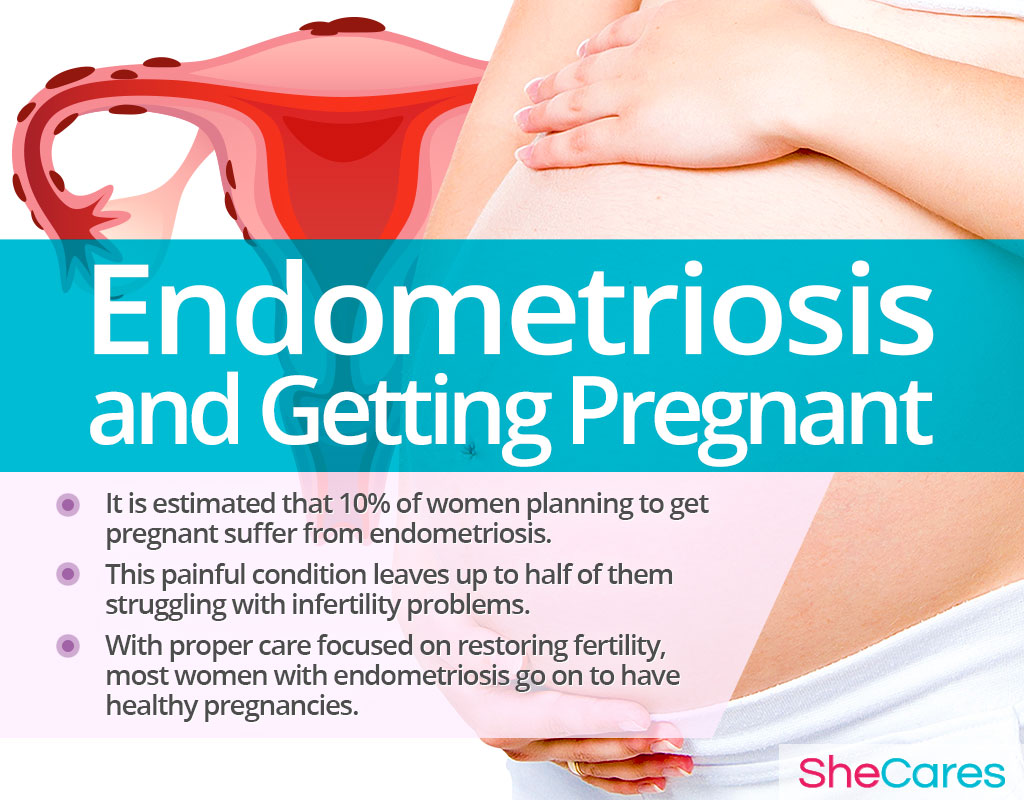Brief Overview of Endometriosis
Endometriosis is a condition in which the lining of the uterus grows outside the uterus. It most commonly grows in the ovaries or the fallopian tubes, but it might also develop in the bladder, bowels, or other parts of the body. Although the causes of endometriosis have not been determined, it is believed that hormonal imbalance and genetics play a role.
Most women with endometriosis experience severe abdominal or pelvic pain, painful menstruation, and heavy or irregular periods. Some, however, do not have any symptoms and first get diagnosed with this condition after unsuccessful conception efforts.
Possible Effects of Endometriosis on Pregnancy
Effects of Endometriosis on Fertility
Endometriosis is known to diminish fertility, but its effects depend on the stage of the condition and the extent of damage to the reproductive organs. It might result in:
- Fallopian tube blockage
- Pelvic inflammation
- Scaring and adhesions
- Abnormalities in pelvic anatomy
- Egg implantation problems
- Poor egg quality
- Ovarian damage
Effects of Endometriosis on the Mother and Baby
Endometriosis has not been associated with causing difficulties during pregnancy or endangering the life of the mother or her baby. In fact, some women experience an improvement in their symptoms.
There has been a small evidence, however, that having endometriosis puts women at an increased risk of a miscarriage, but more research is needed to confirm those claims.
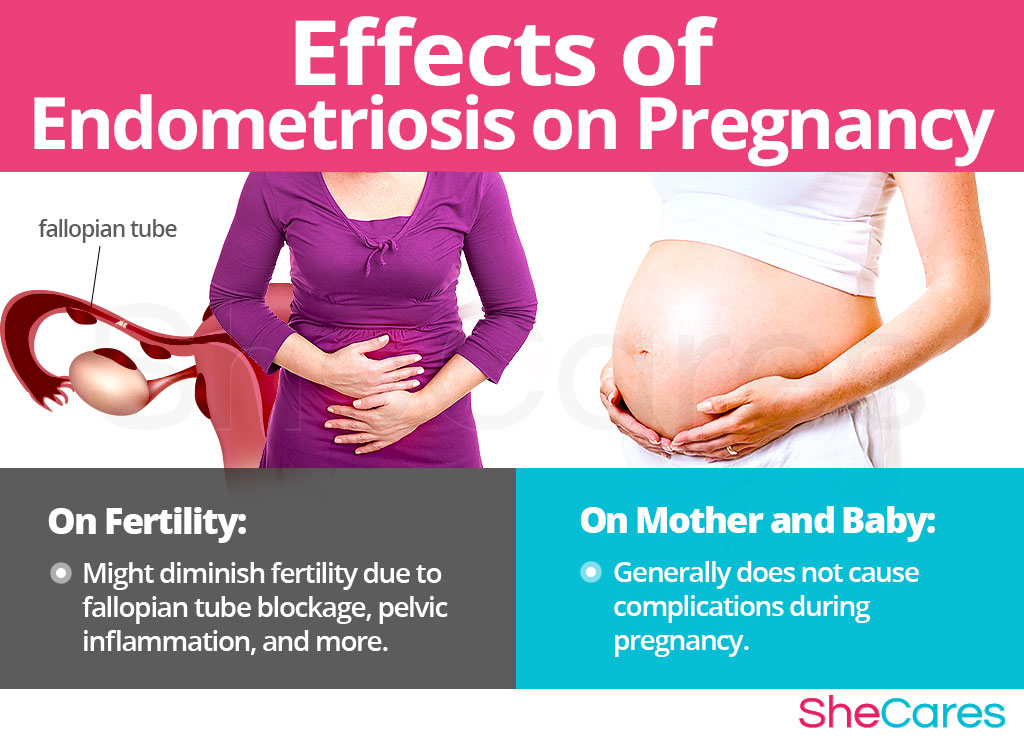
Action Plan
Control Endometriosis before Pregnancy
Your goal prior to getting pregnant is to regulate your hormones and restore your fertility. Because estrogen contributes to the growth of endometriosis, the majority of preconception efforts will focus on lowering its levels in the body. Consider the following recommendations:
Healthy Diet
Studies have shown that limiting the intake of animal proteins and wheat can significantly improve endometriosis and reduce its effects on fertility. Compose your diet of foods rich in the following:
Phytoestrogens: carrots, papaya, or flaxseeds
Plant-based proteins: chickpeas, beans, and lentils
Fiber: whole grains, nuts, or chia seeds
Healthy fats: olive oil, coconut oil, or avocados
Antioxidants: berries, cherries, and spinach
Adequate Exercise
Having excess body fat could lead to increased levels of estrogen in the bloodstream. So, include regular physical activity in your preparations for pregnancy. It can improve your menstrual cycle and fertility, as well.
Try to exercise at least 5 days a week for 30 minutes a day. Good examples of low-impact physical activity include Pilates, swimming, or jogging.
Vitamins and Supplements
Hormone-regulating supplements, such as Macafem, can help you regulate hormonal imbalances and menstruation, thus increasing your chances of conceiving.
Prenatal vitamins with folic acid and iron will prepare your body for pregnancy and prevent birth defects.
Calcium D-glucarate can help excrete estrogen and prevent its build-up.
Diindolylmethane supplements can help remove excess estrogen from the body, thus relieving the symptoms of endometriosis.
Omega-3 fatty acids can reduce inflammation, give your immunity a needed boost, and reduce the symptoms of endometriosis.
Treatment
Endometriosis cannot be cured, but proper treatment can help increase your conception chances. Depending on the severity, you might consider the following:
Pain medications might be effective in mild stages of endometriosis to reduce the symptoms and aid during conception.
Gonadotropin-releasing hormone (GnRH) antagonist can be used in the more advanced stage to trigger temporary menopause, which can also halt the growth of endometriosis. Its discontinuation will restore menstruation and has been shown to improve fertility.
Surgery is the last resort if hormone therapy does not bring the desired results. The endometrial growth and scar tissues can be removed to restore healthy function of the reproductive organs.
Good Habits and Alternative Therapies
Cut down on alcohol and caffeinated beverages as they might raise estrogen levels.
Acupuncture has been shown to relieve endometriosis pain and help resolve hormonal imbalance.
Pelvic physical therapy can relieve muscle pain, reduce nerve impairment, and improve circulation in the pelvis.
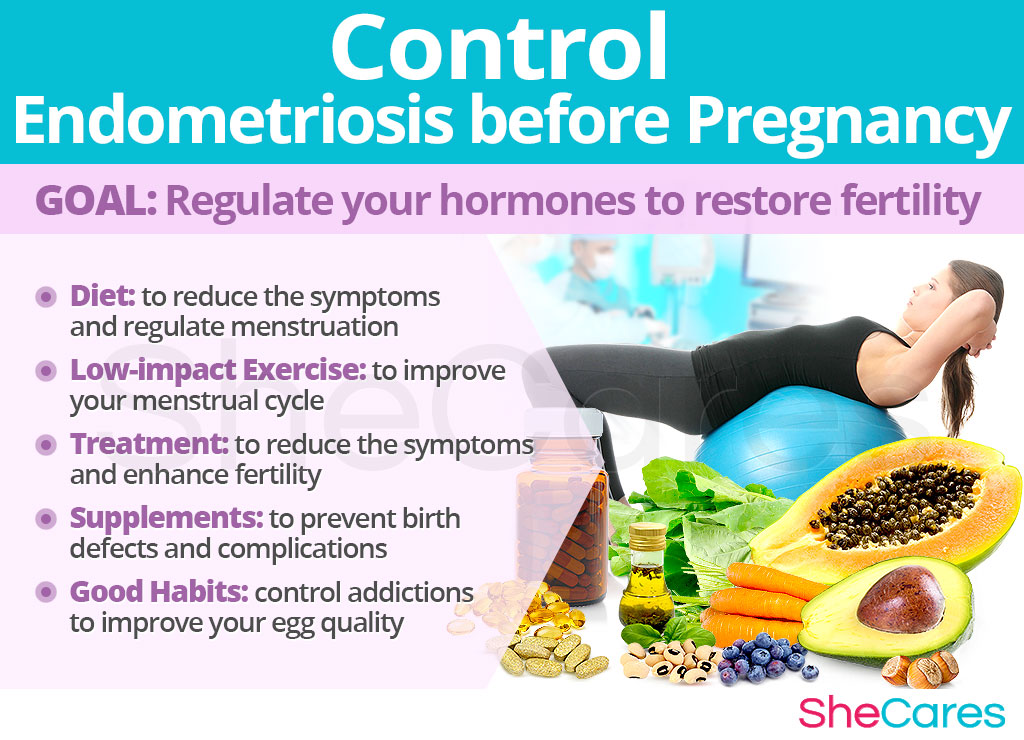
Tips for Conceiving with Endometriosis
When it is time for you and your partner to start conceiving, remember that it can take time. Some couples succeed in getting pregnant naturally, while others have to use assisted reproductive technology (ARS), such as IVF or IUI. To optimize your conception chances, consider the following:
Stress reduction. There are countless ways to unwind and lower your stress, so find what works for you. Try yoga, breathing exercises, and meditation or engage yourself in exploring a new hobby, like photography or painting.
Friends and family. Having a strong network of support can help you cope with naturally rising anxiety with ease. Local endometriosis support groups might also be beneficial.
Aim to have sex frequently five days before and on your ovulation day to increase your chances of succeeding in getting pregnant.
Drink six to eight glasses of water a day to make your vaginal mucous more sperm friendly and to encourage conception.
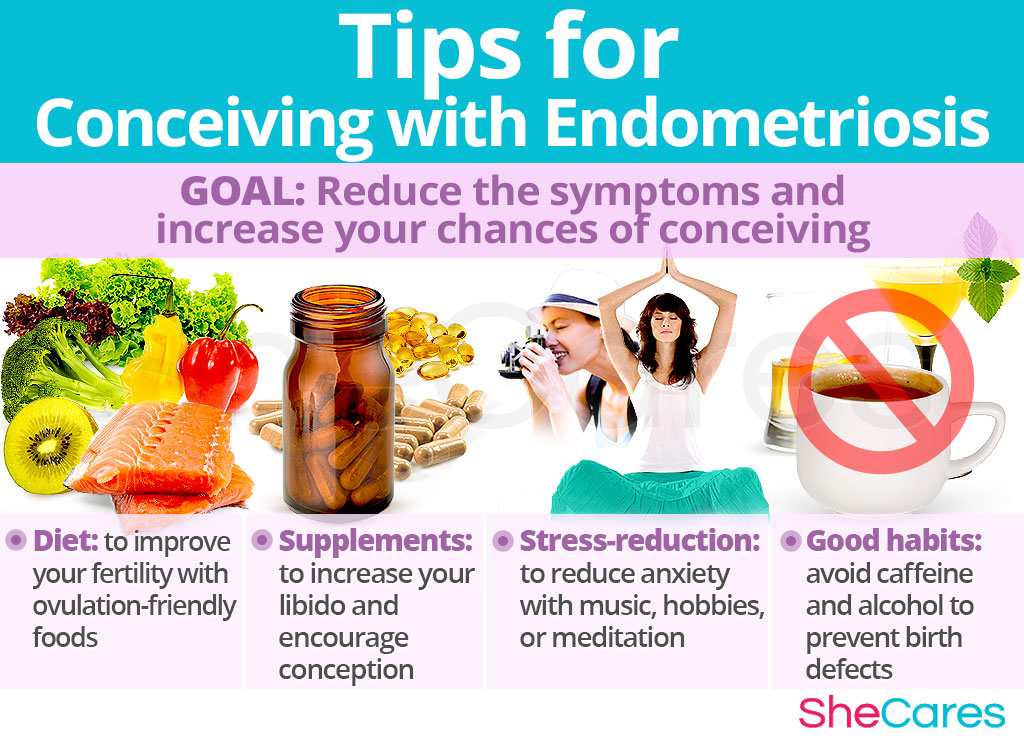
Manage Endometriosis during Pregnancy
During pregnancy, the symptoms of endometriosis often subside. In case you do experience a worsening of symptoms, your doctor will direct you to the safest and most appropriate treatment.
Meanwhile, try to maintain a relaxed and hopeful attitude by:
Maintaining a healthy, endometriosis-friendly diet and staying well hydrated.
Keeping yourself physically active, focusing on low-impact exercises.
Doing yoga or going for physical therapy to relieve pregnancy fatigue or back pain.
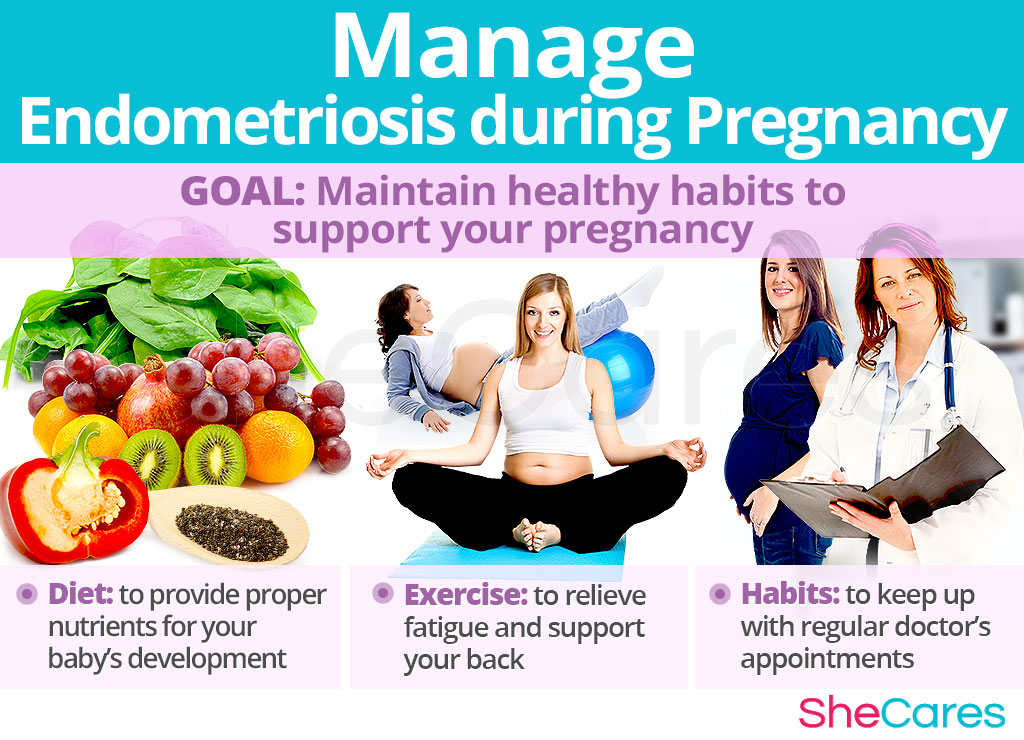
Key Takeaways
There is no doubt that getting pregnant with endometriosis is difficult. Many women struggle with pain and discomfort for years trying to make their dream of motherhood come true. Despite endometriosis being the leading cause of infertility, thousands of women implement healthy lifestyle habits with proper diet, exercise, and supplements, like Macafem, and go on to have successful pregnancies and healthy babies.
Sources
- Health Direct. (2017). How endometriosis affects pregnancy. Retrieved February 13, 2018 from https://www.pregnancybirthbaby.org.au/how-endometriosis-affects-pregnancy
- Journal of Assisted Reproduction and Genetics. (2010). Endometriosis and infertility. Retrieved February 13, 2018 from https://www.ncbi.nlm.nih.gov/pmc/articles/PMC2941592/
- Medline Plus. (2017). Endometriosis. Retrieved February 13, 2018 from https://medlineplus.gov/endometriosis.html
- Obstetrics and Gynecology Clinics of North America. (2013). Endometriosis and Infertility: A review of the pathogenesis and treatment of endometriosis-associated infertility. Retrieved February 13, 2018 from https://www.ncbi.nlm.nih.gov/pmc/articles/PMC3538128/
- Reproductive BioMedicine Online. (2013). Diet and endometriosis risk: a literature review. Retrieved February 13, 2018 from https://www.ncbi.nlm.nih.gov/pubmed/23419794
- The American College of Obstetricians and Gynecologists. (2012). Endometriosis. Retrieved February 13, 2018 from https://www.acog.org/~/media/For%20Patients/faq013.pdf?dmc=1&ts=20130407T1941277956
- The British Jornal of Nutrition. (2010). Diet and risk of endometriosis in a population-based case-control study. Retrieved February 13, 2018 from https://www.ncbi.nlm.nih.gov/pmc/articles/PMC3374872/
- Translational Research. (2013). Antioxidant Supplementation Reduces Endometriosis-Related Pelvic Pain in Humans. Retrieved February 13, 2018 from https://www.ncbi.nlm.nih.gov/pmc/articles/PMC3484190/
- University of Maryland Medical Center. (2016). Endometriosis. Retrieved February 13, 2018 from https://www.umm.edu/health/medical/altmed/condition/endometriosis
- Women's Health. (2017). Endometriosis. Retrieved February 13, 2018 from https://www.womenshealth.gov/a-z-topics/endometriosis
